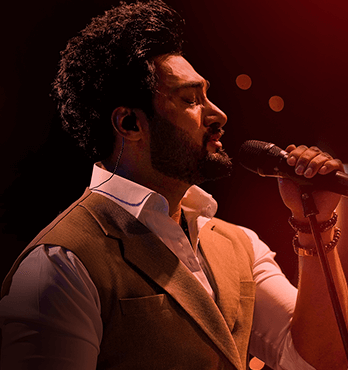Umair Jaswal

by Ayesha binte Rashid
Umair Jaswal reveals himself in layers — when he sits down for his behind the scenes interview for Coke Studio Season 12, he is dressed in black, his t-shirt decorated with a skull, sunglasses hanging at the neck, black beads on his right wrist. An avid health and fitness advocate, he cuts a hulking figure, his gravelly voice hinting at his signature growl. He seems very much the Umair Jaswal his fans have come to know — the Umair you can hear screaming into the mic in Qayaas’s Inquilab, and the Umair looking broodily into the camera with kohl-rimmed eyes in Umeed’s video. Eight years have passed since Qayaas, and while Umair has added much else to his repertoire, the rock n’ roll remains a core part of his persona.
As he begins to talk, Umair opens up easily: “Umair Jaswal is a human, not a man made of plastic – he is a man of clay. He can feel everything. He can be heartbroken; he can feel sad and he can also get angry”.
Talking about a spiritual journey that began over a year ago, Umair opens up about his relationship with God, and the sense of emptiness that sparked this journey. Eloquent and confident thus far, he falters for a moment and his voice cracks, “It’s a very ... it’s a very dark feeling when you feel that you’re not connecting with a higher being. This disconnect is hard to overcome.” He remembers how lost and invisible he felt, “Why can’t I find God? Why isn’t He listening to me? Am I invisible? Am I not a part of His creation?” It’s a moment of vulnerability that catches one off guard, coming as it is from an artist known for his rock star persona — a vulnerability that Umair is now beginning to reveal to his fans.
The first band Umair ever performed with was the Jazz Walls, formed with his five brothers. The band’s top-of-the-line instruments included a cricket bat that substituted for a guitar, a cardboard drum, and a hanging mic made out of a toothbrush tied to the fan — objects that the boys, all young children at the time, had scavenged from around the house. When left to their own devices, the Jazz Walls would put on concerts for imaginary crowds. Umair was too young to know what songs they were pretending to perform, but was an enthusiastic participant nonetheless.
When he was in the 7th grade, Umair’s elder brother introduced him to the vast world of rock n’ roll. “You know those old computers back then, the big ones? They used to have the bulky monitors. Bhai would sit me down and show me albums [on the internet],” — of Led Zeppelin, Aerosmith, Metallica, “everything from glam rock to hair metal.” He was a nineties kid after all, and it was grunge rock that appealed to Umair the most, “It had a certain darkness and loneliness that resonated with me.”
Umair’s grunge favorites included Mother Love Bone, Guns N’ Roses and Soundgarden. “Chris Cornell happened, and everything changed. He is my life’s biggest inspiration in music. The way Chris Cornell resonates with me, no one resonates with me.” Cornell’s passing was hard for Umair, “It changed me,” he says. Cornell was a hero who had fought and survived hard battles,
someone who gave him hope in his own struggles. “I can’t listen to his songs; They just make me so sad.” Cornell continues to influence Umair, “I always used to try and sound like him,” he says, and quickly follows up with, “I can’t sing like him at all. But when I sing, I want to sing with the same conviction.”
Umair emerged onto the Pakistani music scene with Qayaas, a band formed by guitarist Khurram Waqar that quickly gained a cult following amongst Pakistan’s progressive rock audiences. Umair struck out on his own by giving his first solo performance on Coke Studio Season 6. For Umair, “this was a new chapter, in which I wanted to express what’s my own – I wanted to discover my own sound. To do that, the most important thing was that I address my personal thoughts, and what I feel.”
After a short hiatus, Umair began working on his album last year, revisiting ideas and songs that were very private — so private that some had been hidden away for eight years. With Qayaas, Umair thought the ideas were too personal to find a voice in a collective. As a solo artist, he is now beginning to overcome the inhibitions that kept these ideas from being shared. “Life brings you to a point where the shyness eventually goes away, and you have to be honest with yourself. You realize that you want to do your own music, music that comes from the truth.”
Umair is embracing the inherent vulnerability of being an artist, something that he realizes is an inevitable outcome of releasing music into the world. The music he is creating comes from places of seclusion and bleakness and experiences that have caused pain. Umair’s songs now talk of the heartache that follows the loss of a relationship, mapping out his struggle with existentialism and even hint at the loneliness that has come with fame.
As he talks, Umair keeps coming back to the same point: “sachayi” (honesty). The theme seems to permeate, whether he is talking about his music, or spirituality, or fame. He is a person who is ready to tell his truth, no longer prone to hiding behind a persona, and this is evident in his conversation. He admits easily to feeling broken and helpless in the recent years and doesn’t mince his words when he voices the stress of maintaining a celebrity facade for fans.
“For most of my life, I was a shy child,” Umair reminisces after his performance this Season, “I could never make a lot of conversation. I wanted to become a musician because I thought I could, perhaps, express myself through music.” Over a decade in the music industry, two with a progressive rock band and eight as a solo artist, Umair Jaswal has begun to reveal himself in layers, giving voice to his truth through music – forever in the pursuit of honesty and alongside the conviction of his childhood hero. And in this process, the unravel continues.
